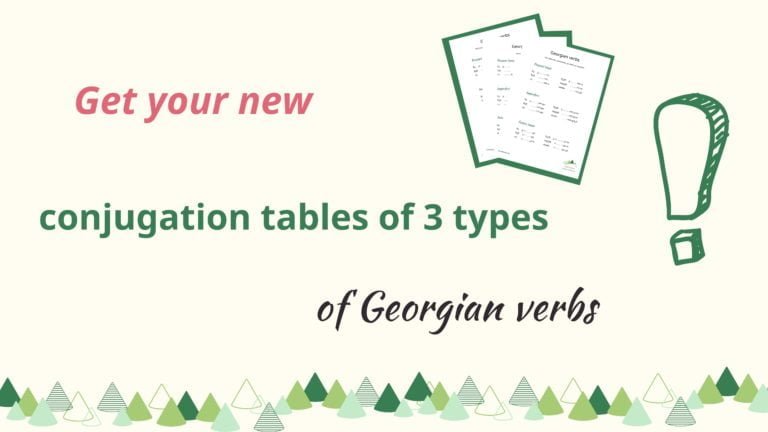Let’s learn how to use imperfect tense in Georgian, by asking what were you doing? Where were you living? If you want to know the tense’s general rules to use it on your own, this post is just for you!
If you know Georgian a little bit already, probably you can use several verbs on your own as well. Additionally, probably you also distinguish a bit transitive and intransitive verbs in Georgian. Today we’ll focus on the transitive ones. What does it mean? Those are the ones when the subject is in the first Georgian case, in Nominativ. Especially you can see it in the 3rd person, when there are ის and ისინი. What is more, typical for those verbs is to have ვ- marker in the 1st singular and plural persons.
When do you use imperfect tense?
Let’s start when to use imperfect tense. The rules from other languages, e.g. English will not be fully applicable here. Imperfect is being used when you want to talk about something you were doing in the past for quite some time or when it was being done in the past but was not finished or we do not know whether it was finished. Furthermore, you can use this tense when you had a habit of doing something in the past, e.g. each Morning I was eating breakfast.
What fascinates me in the forms of Georgian past tense is that there may be situations when you use both, imperfect and so called aorist past tense (similar to past simple) and the meaning of the sentence will be practically the same. For example I was living or I lived will have the same meaning, but you can use one of those two tenses. If you think now: Great, so how can I know which form to use? Do not worry. You can learn it, especially by having regular contact with the language. The more contact with Georgian (via reading and listening as well), the more you get slight nuances.
How does the Georgian verb conjugation in imperfect look like?
Today we’ll focus on already mentioned transitive verbs. As an example we’ll use the verb “to live nowhere”, მუშაობა. Let’s first look at it’s conjugation in the present tense:
მე ვმუშაობ
შენ მუშაობ
ის მუშაობს
ჩვენ ვმუშაობთ
თქვენ მუშაობთ
ისინი მუშაობენ
Now let’s see how does it look like in imperfect:
მე ვმუშაობდი
შენ მუშაობდი
ის მუშაობდა
ჩვენ ვმუშაობდით
თქვენ მუშაობდით
ისინი მუშაობდნენ
As you may see, there are not many differences between the present and imperfect forms. The key point is to remember about adding the endings. We do not change anything in the beginning of the verb. You may notice that also the endings typical for the present tense will not be used (those were used in 3rd person singular and plural. Now, with imperfect, the other endings will be used.
If you struggle with recognizing the imperfect form, remember that it will be:
- Build based on the present tense, not other form of the verb. So you cut off the endings from the present and “just” add the imperfect ones.
- There is always letter –დ– in the ending.
What’s important is that in the imperfect sentence with this group of verbs there is no change of the cases being used. It means that the object will be in the 3rd case and the subject in the 1st.
Exactly with this pattern are being conjugated the transitive verbs, so for example “to work”, “to talk”, “to do” or “to spend time”. Do you know any other verbs that belong to this group? Let us know in the comments!

